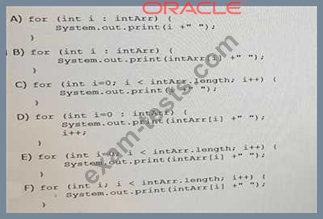Question 166
The data.doc, data.txt and data.xml files are accessible and contain text.
Given the code fragment:
Stream<Path> paths = Stream.of (Paths. get("data.doc"),
Paths. get("data.txt"),
Paths. get("data.xml"));
paths.filter(s-> s.toString().endWith("txt")).forEach(
s -> {
try {
Files.readAllLines(s)
.stream()
.forEach(System.out::println); //line n1
} catch (IOException e) {
System.out.println("Exception");
}
}
);
What is the result?
Given the code fragment:
Stream<Path> paths = Stream.of (Paths. get("data.doc"),
Paths. get("data.txt"),
Paths. get("data.xml"));
paths.filter(s-> s.toString().endWith("txt")).forEach(
s -> {
try {
Files.readAllLines(s)
.stream()
.forEach(System.out::println); //line n1
} catch (IOException e) {
System.out.println("Exception");
}
}
);
What is the result?
Question 167
Given that course.txt is accessible and contains:
Course : : Java
and given the code fragment:
public static void main (String[ ] args) {
int i;
char c;
try (FileInputStream fis = new FileInputStream ("course.txt");
InputStreamReader isr = new InputStreamReader(fis);) {
while (!isr.close()) { //line n1
isr.skip(2);
i = isr.read ();
c = (char) i;
System.out.print(c);
}
} catch (Exception e) {
e.printStackTrace();
}
}
What is the result?
Course : : Java
and given the code fragment:
public static void main (String[ ] args) {
int i;
char c;
try (FileInputStream fis = new FileInputStream ("course.txt");
InputStreamReader isr = new InputStreamReader(fis);) {
while (!isr.close()) { //line n1
isr.skip(2);
i = isr.read ();
c = (char) i;
System.out.print(c);
}
} catch (Exception e) {
e.printStackTrace();
}
}
What is the result?
Question 168
Given:
public class Product {
int id; int price;
public Product (int id, int price) {
this.id = id;
this.price = price;
}
Public String toString () { return id + ":" + price;)
}
and the code fragment:
List<Product> products = new ArrayList <> (Arrays.asList(new Product(1, 10),
new Product (2, 30),
new Product (3, 20));
Product p = products.stream().reduce(new Product (4, 0), (p1, p2) -> {
p1.price+=p2.price;
return new Product (p1.id, p1.price);});
products.add(p);
products.stream().parallel()
.reduce((p1, p2) - > p1.price > p2.price ? p1 : p2)
.ifPresent(System.out: :println);
What is the result?
public class Product {
int id; int price;
public Product (int id, int price) {
this.id = id;
this.price = price;
}
Public String toString () { return id + ":" + price;)
}
and the code fragment:
List<Product> products = new ArrayList <> (Arrays.asList(new Product(1, 10),
new Product (2, 30),
new Product (3, 20));
Product p = products.stream().reduce(new Product (4, 0), (p1, p2) -> {
p1.price+=p2.price;
return new Product (p1.id, p1.price);});
products.add(p);
products.stream().parallel()
.reduce((p1, p2) - > p1.price > p2.price ? p1 : p2)
.ifPresent(System.out: :println);
What is the result?
Question 169
Given the following classes:

And given the following main method:

Which two options fail to compile when placed at line n1 of the main method?

And given the following main method:

Which two options fail to compile when placed at line n1 of the main method?
Question 170
Given the following array:

Which two code fragments, independently, print each element in this array?


Which two code fragments, independently, print each element in this array?


